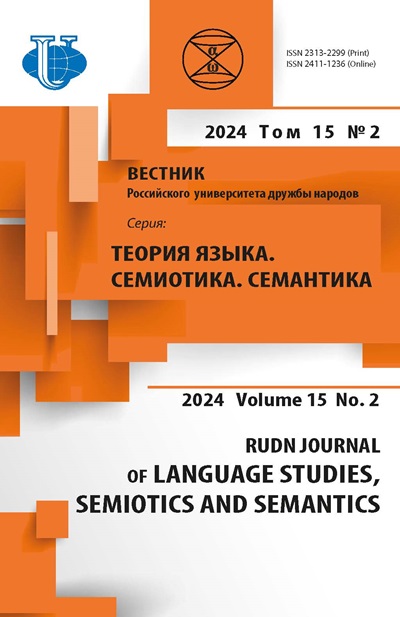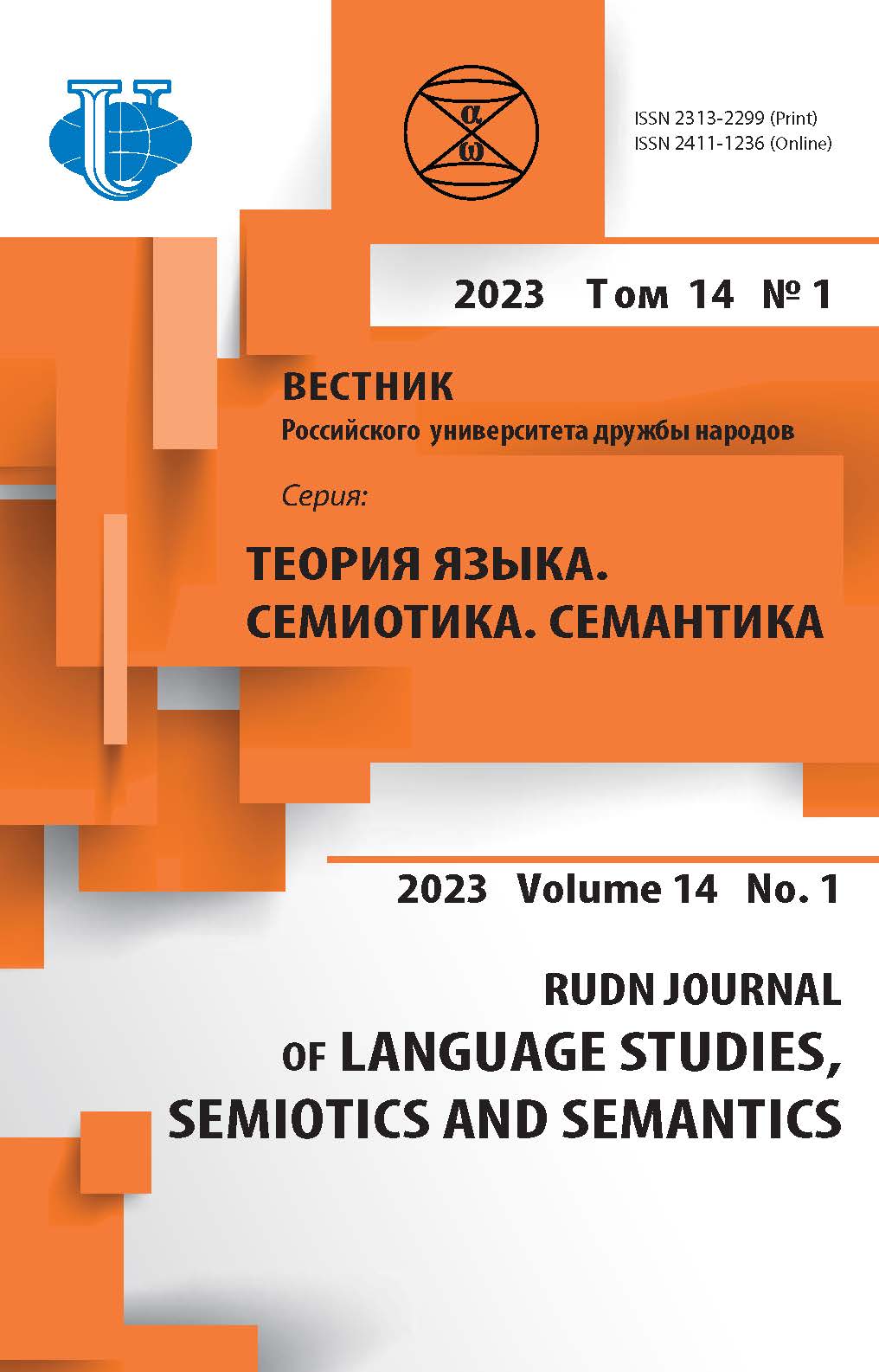Intertextual Character of Poetic Philological Discourse
- Authors: Antonova E.N.1
-
Affiliations:
- State University of Land Use Planning
- Issue: Vol 14, No 1 (2023)
- Pages: 245-259
- Section: SEMIOTICS & FICTION TEXT STUDIES
- URL: https://journals.rudn.ru/semiotics-semantics/article/view/34180
- DOI: https://doi.org/10.22363/2313-2299-2023-14-1-245-259
- EDN: https://elibrary.ru/PNDZSW
Cite item
Full Text
Abstract
The poetic-philological discourse functions as a linguocultural phenomenon in the Russian intertext. The relevance of the study is due to the consistent systematization of knowledge about philological poetry as a special type of discourse, a multidimensional analysis of the literary works of poets-phraseologists is carried out. The purpose of the work undertaken was to form ideas about the elocution of the scientist’s artistic world, that is, the materialization of the cognitive program, in the creative workshop of his philological experience. Poetry collections of modern researchers of the Russian language, specialists in the field of linguoculturology and phraseology, paremiology, and byword studies served as materials. On the basis of the predecessor works devoted to the Russian text, discourse, intertext, interpretative, linguoculturological and axiological accents are placed in the study of idiostyle, taking into account the professional position of the author. The methods of work included the observation of philological poetry and the description of its characteristic features, the systematization of the verbal tools of philologists-poets, analytical work with theoretical and factual material, deepening and expanding existing research on the specifics of Russian intertext and discourse. The main points of the study were the coverage of the intertextual properties of Russian discourse in the linguoculurological aspect, the analysis of the distinctive features of philological poetry in the conditions of intertext and in the interaction of creativity and science. The conclusions made in the course of the study determined the unique intertextual position of the poetic experiences of linguists, based on the shift of the center of poetic thought towards epistemological tendencies. In conclusion, the innovative nature of images, symbols, ideas in philological poetry is noted, directions for its further study, as well as the study of Russian intertext and poetic discourse, are outlined.
About the authors
Elena N. Antonova
State University of Land Use Planning
Author for correspondence.
Email: stchl@yandex.ru
ORCID iD: 0000-0002-6785-3994
Candidate of Philology, Associate Professor of the Department of Russian and Foreign languages, Director of the Center for Communications and Media Technologies
15, Kazakova str., Moscow, Russian Federation, 105064References
- Chumak-Zhun, I.I. (2009). Poetic Text in Russian Lyrical Discourse of the Late 18th—Early 21st Centuries: Monograph. Belgorod: BelSU publ. (In Russ.).
- Bisimalieva, M.K. (1999). On the concepts of text and discourse. Philological Sciences, 2, 78–85. (In Russ.).
- Alefirenko, N.F. (2005). Linguistic and cultural synergetics of discourse. In: Linguistic paradigms and linguodidactics. Part. 1. Irkutsk. pp. 22–27. (In Russ.).
- Arutyunova, N.D. (1990). Metaphor and discourse. In: Theory of metaphor, Arutyunova (Ed.). Moscow: Progress. pp. 5–32. (In Russ.).
- Babenko, L.G. & Kazarin, Yu.V. (2003). Linguistic analysis of a literary text. In: Theory and Practice. Moscow: Flinta: Nauka. (In Russ.).
- Astremskaya, E.V. (1998). Psycholinguistic foundations of understanding the text as a carrier of a certain culture. In: Russian language in the context of modern culture. Ekaterinburg: Ural State University publ. pp. 5–7. (In Russ.).
- Butakova, L.O. (2001). Author’s consciousness in poetry and prose: cognitive modeling. Barnaul. (In Russ.).
- Galperin, I.R. (1980). Retrospection and prospection in the text. Philological Sciences, 5, 44–52. (In Russ.).
- Goncharenko, S.F. (1999). Poetic translation and translation of poetry: constants and variability. In: Translator’s Notebooks. Iss. 24. Moscow: MGLU publ. pp. 108–111. (In Russ.).
- Dyck, T.A. van. (1978). Questions of text pragmatics. In: New in foreign linguistics. Iss. 8: Text Linguistics, T.M. Nikolaeva (Ed.). Moscow. pp. 259–336. (In Russ.).
- Nikolaeva, T.M. (1987). Metatext and its functions in the text (on the material of the Mariinsky Gospel) In: Studies in the structure of the text, T.V. Tsivyan (Ed.). Moscow: Nauka. pp. 133–146. (In Russ.).
- Lazareva, A. (2020). Analyzing Digital Discourse. New Insights and Future Directions. Edited by Patricia Bou-Franch and Pilar Garcés Conejos Blitvich (2019). Journal of Language and Education, 6–3 (23), 185–188.
- Antonova, E.N. (2019). Realization of the anthropomorphic principle in Russian proverbs. In: IV Firsovskie chteniya. Language in modern discursive practices. materials of reports and messages of the International scientific-practical conference, RUDN University. Moscow. pp. 208–214. (In Russ.).
- Karasik, V.I. & Kitanina, E.A. (2020). Contextualization of secret in everyday and institutional types of discourse. Issues of Cognitive Linguistics, 4, 64–72. (In Russ.).
- Chumak-Zhun, I.I. (2012). Emotional-Aesthetic Perception and the Poetic Text Informativity. Issues of Cognitive Linguistics, 1 (30), 143–146. (In Russ.).
- Gasparov, M.L. (2002). Literary intertext and linguistic intertext. Izvestiya AN. Seriya literatury i yazyka, 61(4), 3–9. (In Russ.).
- Grishkova, O.N. (2004). Intertext in the Aspect of Discursive Understanding of the Text. In: Russian Language: Historical Destinies and Modernity: II International Congress of Russian Language Researchers. Moscow: Publishing House of Moscow State University publ. pp. 386–387. (In Russ.).
- Ilyin, I.P. (1989). Stylistics of intertextuality: theoretical aspects. In: Problems of modern stylistics. Moscow. pp. 186–207. (In Russ.).
- Bazanova, A.E., et al. (2019). Functions of intertext and their influence on the perception of economic media text by the audience. Sovremennaya Nauka: Aktual’’nye Problemy Teorii i Praktiki. Seriya: Gumanitarnye Nauki, 12 (2), 155–158. (In Russ.).
- Kuzmina, N.A. (2009). Intertext: theme with variations. Phenomena of culture and language in intertextual interpretation: monograph. Omsk. (In Russ.).
- Fateeva, N.A. (2017). Poetry as a philological discourse. Moscow: YaSK Publishing House: Languages of Slavic Culture. (In Russ.).
- Antonova, E.N. (2019). Philological Poetry as an Aspect of Linguistic Personality. Cognitive Studies of Language, 37, 968–973. (In Russ.).
- Popova, A.R. (2022). Genre of Stihofrazy: creative possibilities of Russian phraseology: monograph. Orel: Gorizont LLC. (In Russ.).
- Novospasskaya, N.V. (2020). Linguosemiotics. Paremiology: Modern trends. RUDN Journal of Language Studies, Semiotics and Semantics, 11(2), 145–150. https://doi.org/10.22363/23132299-2020-11-2-145-150 (In Russ.).
- Baranov, A.N. & Dobrovol’skij, D.O. (2019). Idiomaticity of reduplicated forms. Voprosy Jazykoznanija, 6, 51–67. https://doi.org/10.31857/S0373658X0007546-9 (In Russ.).
- Popova, A.R. (2008). Artistic methods of humanizing the material world in V. Bryusov’s story “Flat”. Journal of Mining Institute, 175, 39–40. (In Russ.).
- Urazaeva, K.B., Lomakina, O.V. & Mokletsova, I.V. (2019). Methods of Chekhov`S Character Conceptual Strategy Generation (Based on Short Stories). Bulletin of Slavic cultures, 53, 156– 168. (In Russ.).
- Yakovlev, A.A. (2020). On the psycholinguistic theory of consciousness. Siberian Journal of Philology, 3, 298–310. (In Russ.).
- Antonova, E.N. (2018). Axiological component in the discourse of poetic phraseology. In: Polyparadigmatic contexts of phraseology in the XXI century. Materials of the international scientific conference. pp. 199–203. (In Russ.).
- Bredis, M.A., Dimoglo, M.S. & Lomakina, O.V. (2020). Paremias in Modern Linguistics: Approaches to Study, Text-Forming and Linguocultural Potential. RUDN Journal of Language Studies, Semiotics and Semantics, 11 (2), 265–284. https://doi.org/10.22363/2313-2299-202011-2-265-284 (In Russ.).
- Bredis, M.A., Lomakina, O.V. & Mokienko, V.M. (2020). Rusin Phraseology as an Example of Cultural and Linguistic Transfer in Slavic Languages (Based on Numerative Units). Rusin, 60, 198–212. https://doi.org/ 10.17223/18572685/60/12 (In Russ.).
- Ganapolskaya, E.V. (2020). Russian Phraseological Minimum: Reality and Prospects. RUDN Journal of Language Studies, Semiotics and Semantics, 11 (3), 496–516. https://doi.org/10.22363/2313-2299-2020-11-3-496-516 (In Russ.).
- Lomakina, O.V. (2018). Upotreblenie frazeologicheskikh edinits kak cherta yazykovoy lichnosti L.N. Tolstogo: iz opyta analiza rechi avtora i personazhey khudozhestvennykh proizvedeniy. Cuadernos de Rusística Española, 14, 39–47. (In Russ.).
- Piotrovskaya, L.A., & Trushchelev, P.N. (2022). Communicating recipient’s emotions: Text-triggered interest. Training, Language and Culture, 6(1), 60–74. https://doi.org/10.22363/2521-442X-2022-6-1-60-74
- Lomakina, O.V. & Mokienko, V.M. (2019). The Conceptual Dichotomy “God” — “Devil” in Russian Phraseology and Paroemiology (against the Slavic Background). Tomsk State University Journal, 447, 55–62. (In Russ.).
- Norman, B.Yu. (2020). Comparative Slavic Phraseology and Paremiology: Cornerstones and Stumbling Blocks. Vestnik of Saint Petersburg University. Language and Literature, 17(3), 446–456. (In Russ.). 10.21638/spbu09.2020.306
- Seliverstova, E.I. (2020). The phenomenon of proverb deformation through the prism of the laws of paremiological space. Vestnik of St. Petersburg University. Language and Literature, 17(3), 457–473. https://doi.org/10.21638/spbu09.2020.307 (In Russ.).
- Semenenko, N.N. (2020). Axiology of Proverbs in the Focus of the Problem of Cognitivediscursive Modeling of Semantics of Russian Proverbs. RUDN Journal of Language Studies, Semiotics and Semantics, 11(2), 213–232. https://doi.org/10.22363/2313-2299-2020-11-2213-232 (In Russ.).
- Antonova, E.N. (2020). Phraseological and paremiological aspect of the linguistic personality in the synchrony of linguistic culture. Social and humanitarian sciences in the Far East, 17(1), 71–78. (In Russ.).
Supplementary files














